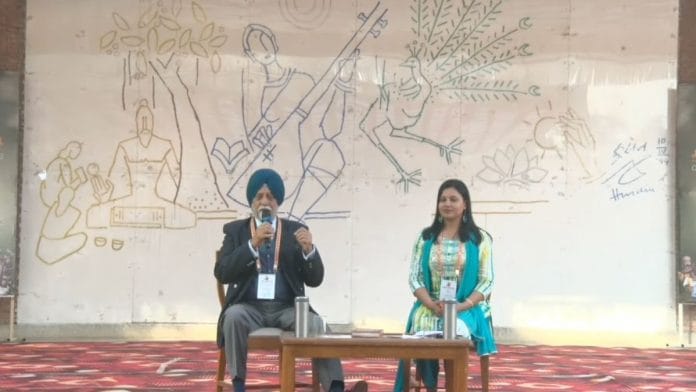Hisar: It has been more than 25 years since the Kargil war in 1993, a period during which much has been written about what happened in the war and how it was fought. But somehow, although things were alluded to, much of the the story has not been written as writers wanted to be politically correct. That’s the belief that egged Major General (Retd) Lakhwinder Singh into taking on the job himself.
Discussing his book, ‘The Untold Kargil Story’, on the third day of the Jindal Literature Festival, the Kargil veteran described the harsh winter conditions and terrain of Kargil. “There is an unwritten understanding between Pakistan and India that in the winters, when temperatures go as low as -30 degrees, and the wind speeds are very high, we both vacate these heights and at the onset of summer, we come back to these heights. This had been going for long years,” he said at the session moderated by Major (Retd) Isha, head of administration at Jindal Stainless.
In 1999, Pakistan’s General Musharraf, as a “good General”, knew when to break the rules, Singh said. So when Indian troops retreated from the border at Kargil, unaware that the border had been breached, enemy soldiers had the benefit of height.
Continuing the conversation, the moderator posed a question about what the genesis of this war had been, why the Pakistani army wanted to take over the Dras post. She also asked why India had been late in reacting to the assault in Kargil.
One reason that Singh attributed the war to were the sentiments of Pakistan. They lost three wars to India in the period between 1947 and 1948, and in 1988 their plan to take full control of the Siachen glacier was preempted, he said. In addition to this, India also helped Bangladesh gain nationhood, taking away from Pakistan its eastern territory. “It was always on their minds: How can a Hindu India be better than a Muslim Pakistan? It’s in their ethos,” Singh said.
Revenge, said the author, had been on the minds of Pakistani generals for years. “It is surprising that in the whole army, other than Musharraf, only three other generals knew the plan. Not the Pakistani air force, not the Pakistani navy, they say not even Prime Minister Shareef. No one knew about this plan,” he said. Singh expressed amazement at how General Musharraf had, in complete secrecy, been able to deploy his forces to stay at such heights.
Asked about what has been called a delayed reaction on India’s part, Singh went on to clarify that the Indian nation, at the time, had been focused not on war with Pakistan, but on counterinsurgency, dealing with the Mujahideen in Kashmir. Moreover, there was a perception that since Pakistan’s road development and infrastructure were very poor, and preparations for war would be slower on their part.
“But Musharraf Sahab did a great job,” Singh said, elaborating on the cunning with which the Pakistani general had sent more troops to the LoC under the garb of replacing them.
The conversation then turned to Singh himself, who was then commanding the artillery, and his decision which changed the course of the Kargil war: Deploying a hundred 155mm Bofors guns in direct firing. Singh recalled how every time they fired, shouts for help would resound from the other side.
The artillery’s significance, after the war had been won by India, was acknowledged by none other than General Musharraf himself. “If it was not for the Indian artillery, we would never have lost the heights. We were forced to vacate the heights because of the Indian artillery,” the author quoted Musharraf as saying.
“We need to understand one thing, this is not some story we are talking about. This man has lived that moment, he was in that situation, in that place where he could see bullets firing, guns firing,” Major (Retd) Isha reminded the young audience at the Jindal Literature Festival.
ThePrint is the official media partner for the Jindal Literature Festival.
(Edited by Viny Mishra)
Also read: ‘All thanks to Nalanda’—tracing ancient university’s influence in today’s math & AI at Jindal Lit Fest






